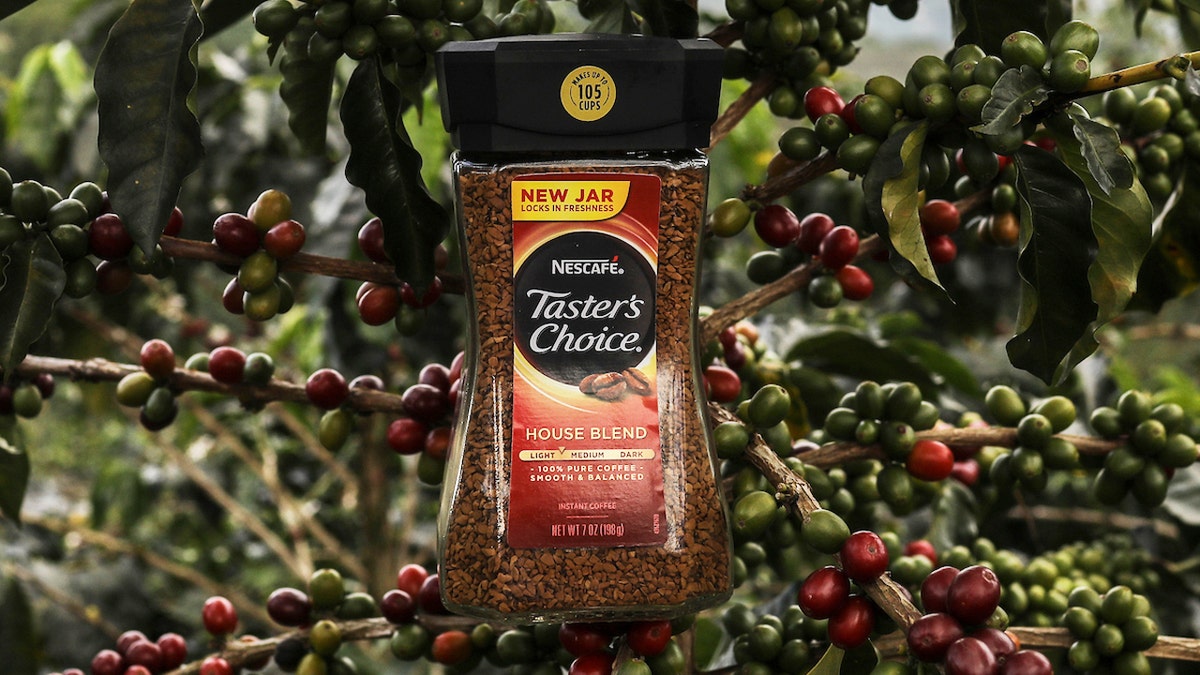
Nescafe is the world's largest producer of instant coffee crystals. (Joaquin Sarmiento/AP Images for Nestlé Nescafé Taster’s Choice)
Some people love instant coffee. Others hate it. For on-the-go coffee lovers, it’s a lifesaver. For coffee snobs, it’s dead on arrival.
Whether you can’t live without it or you can’t live with knowing it’s in your cupboard, you may be interested to know just how much history and technology have gone into a small scoop of one of the world's most popular drinks.
Instant coffee came into widespread production in the early 1900s, but it wasn’t until World War I, and then again in World War II, that it really became popular, says Mark Pendergast, author of "Uncommon Grounds and Beyond Fair Trade."
“It's difficult in trenches to brew coffee, so having instant coffee was a big improvement,” he said.
COFFEE COMPANY TAKES ON STARBUCKS' REFUGEE PLAN, PLEDGES TO HIRE 10,000 VETERANS
Then it became even more popular. “After World War II, America became obsessed with technologically advanced methods of getting things quickly, like TV dinners and canned foods. Instant coffee was a part of that wave.”
But it wasn't only for its ease and convenience. In the mid-1960s, Nestlé, which had been selling an instant coffee it called Nescafé since the 1930s, developed the first freeze-dried coffee, which it marketed in the U.S. as Nescafé Taster’s Choice. For the first time, instant coffee tasted more like … coffee.
To produce it, the makers brewed a coffee concentrate and then locked in the flavor by exposing it immediately to sub-zero temperatures — a process called flash freezing. The frozen concentrate then was sent through a vacuum chamber to remove all moisture, resulting in freeze-dried coffee granules.
“It was a huge advance,” Pendergast said. “By far a better coffee.”
But that was a half-century ago. Today, Nescafé says it’s still evolving its “unique proprietary process which is backed by a significant number of granted and pending patents.” And it must be doing something right: Today, Nescafe (known as Tasters' Choice in the U.S.) is the No. 1 coffee brand in the world, holding a 22 percent share of all the coffee consumed on the planet, according to data from Euromonitor International.
But that doesn't mean others haven't tried to enter the game with their own takes on the technology.
In 2009, Starbucks introduced an instant coffee called Via, which uses a proprietary spray-drying process. Another contender is Sudden Coffee. Co-founded by the 2015 Finnish barista champion (yes, that really is a thing) and an engineer, Sudden uses a unique drying process to create a higher-end instant coffee.
The higher-end brands are more expensive than typical instant coffees — Via costs around $1 a cup and Sudden goes for around $3 a cup — but they could gradually become game-changers.
But what do traditional coffee experts think about instant java? Kevin Sinnott, aka “Coffee Kevin” at Coffee Companion, thinks regular ground bean coffee is too delicate to be compared to instant coffee because it's meant to be made fresh everytime.
“The challenge is we are trying to keep volatile oils around, and they dissipate so quickly,” he tells Fox News. “It’s hard to mass produce. The volatility of coffee is so great.”
But Kenneth Davids, editor of Coffee Review, has a more generous assessment. “The instant coffee people have been phenomenally inventive in trying to extract the aromatics in brewing and trying to put it back in the coffee,” Davids said. He agreed, though, that “it's never going to be as good as a top-end, micro-lot coffee from a great roaster, brewed carefully."
FOLLOW US ON FACEBOOK FOR MORE FOX LIFESTYLE NEWS
“There's no comparison between that and even the best instant coffee, because coffee is a very vulnerable and delicate beverage once it's roasted," Davids added. "That's why coffee goes stale so quickly.”
Erin Meister, a coffee seller with Cafe Imports, cautions against judging any coffee before trying it. "It’s one of those things that people take a really hard line on without understanding why," she said. "Snobbery is one reason, ignorance, pushback against convenience. Sometimes it's what you want."
Davids doesn’t think it’s impossible to create an instant coffee that can fool the experts, but he says the instant coffee companies aren’t quite there yet. He said he was particularly disappointed by Via, because of all the hype surrounding its production process.
Many instant coffees used to be made with lower-quality Robusta beans, but today many brands use only Arabica. But will they ever be good enough to get coffee addicts to put away their artisanal roasts and go back to quick and simple? Only time and technology will tell.